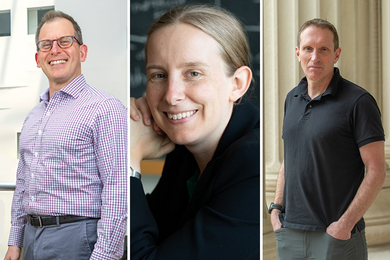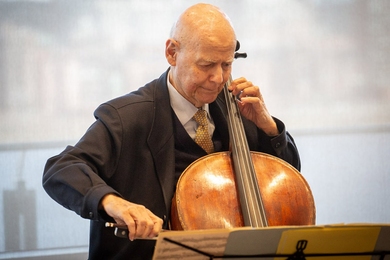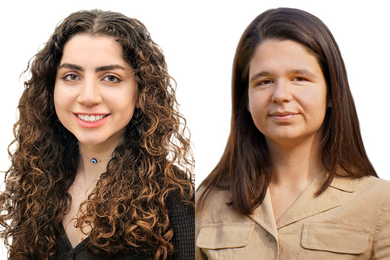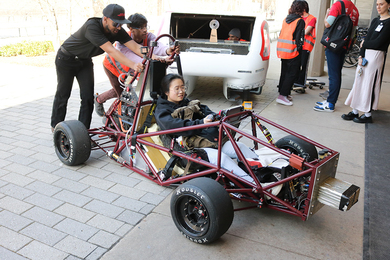Tenured faculty members joined secretaries, administrators, clerical and Facilities workers around the conference table, gathered for a common purpose: to help each other cope with life's problems and remain sober.
"There is no caste system around that table," said a longtime participant. "Professors sit next to groundskeepers. We're all equal."
The early-morning discussions, facilitated by Ronald C. Fleming, are a centerpiece of the Institute Personal Assistance Program (IPAP), created 20 years ago on Valentine's Day. Dr. Fleming has been the director of the program since its inception.
Considered innovative in 1979, the program is now mainstream, providing services to MIT employees and their families, primarily for problems related to alcoholism, drug abuse, marital and family situations, and the challenges of caring for aging parents.
The program's philosophy and goals -- assisting people facing significant personal problems and preserving careers -- have not changed. "One of our guiding principles is that MIT's primary asset is its people," said Dr. Fleming.
During its first year, 95 employees sought help from the IPAP. The types of personal problems faced by employees have remained fairly constant over the last 20 years, although additional demands have arisen in recent years generated by the Institute's need to help manage some of the impact of layoffs and reengineering.
The IPAP, part of the Medical Department, is available to employees on the MIT campus and at Lincoln Laboratory and the Whitehead Institute as well as their immediate families. Many new clients are referred to the IPAP by colleagues who have received services in the past. All visits and records are held in strict confidence. When required, sick leave may be arranged for employees who need inpatient treatment or rehabilitation. The program also offers consultation and training for supervisors.
The IPAP helped organize and is part of the Human Services Network (HSN) at MIT, a quasiformal collection of people and offices that each provide some type of human service to people who work, live or study at MIT. Group members meet periodically to improve their own skills and to discuss ways to identify and better serve the human-service needs that exist at MIT.
"We don't want anybody free-falling," said Dr. Fleming. "We want every person in need to be caught by some part of the HSN safety net. Hopefully, they get what they need. That's always the bottom line for us."
The IPAP was created after an ad hoc committee chaired by Dr. Alfred Koumans Jr. of the Medical Department considered a wide variety of issues for four years starting in 1974. Representatives from faculty, staff, the Personnel Department (as it was then called), the Medical Department, the Women's Forum and two unions -- the RDTEU and Local 254 of the AFL-CIO -- served on the committee.
"It is fair to state that the cost of the program is returned to MIT many times over by the employees retained in satisfactory employment, diminished medical expenses, accidents and time lost, among others," Dr. Koumans wrote in assessing IPAP's first year, during which only 18 of the 95 clients left MIT (47 were considered in jeopardy of doing so when they entered the program).
Success stories abound. Here are a couple:
The professor had been on the faculty for more than 10 years and he thought he was functioning effectively, even though he kept a bottle of vodka in his filing cabinet. He had once stopped drinking on his own -- "white-knuckled it" -- and was seeing Dr. Fleming individually every two weeks. But after several months of sobriety, he started drinking again. His family life was a shambles. The professor considered suicide, he said, "but I didn't have the guts to do anything about it."
Some colleagues convinced him that he needed help, and Dr. Fleming arranged for the professor to go to a detoxification center. A year later, still sober, his daughter presented him with an expensive pen-and-pencil set for his birthday. The previous year, she'd brushed him off with a jar of instant coffee and a day-old croissant. Still sober in 1989, he attended that daughter's high school graduation with his wife and friends. "I probably wouldn't have been able to do that if I was still drinking," he said.
The professor hasn't had a drink since March 25, 1984 and attends Alcoholics Anonymous meetings regularly. If he'd continued to drink, the professor said, "ultimately, I would have done something so outrageous that I would have been asked to leave MIT, even though I was tenured." His family is intact and life is good. "I have to thank Ron and MIT for that," he said
Another story: at the suggestion of her supervisor whose own child had similar problems, the secretary turned to Dr. Fleming in the early 1980s for guidance and solace over her concern for a mentally ill son and a deteriorating marriage.
Dr. Fleming had practical suggestions about how to seek help for her son and deal with her family situation. He made her aware of other links in and outside the MIT support system. Also, before the secretary became aware of her own problem with alcohol, Dr. Fleming picked up cues that it could be complicating her life and suggested she attend group meetings.
"The whole program saved my life," the secretary said. "My son's not in jail and he's certainly not dead, as a psychiatrist had once prognosticated, and I have been sober for 15 years. The fact that I was here, where a program existed that gave me my life back, is a miracle. My gratitude for an employee benefit based on expertise, compassion and support goes well beyond words."
A version of this article appeared in MIT Tech Talk on February 24, 1999.





